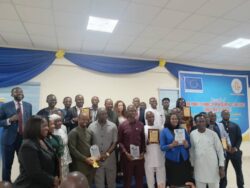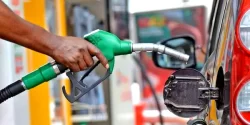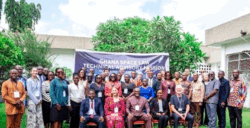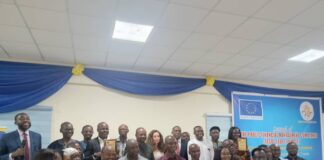Imagine your typical hot day in the city. As you’re walking along the road, you hear a familiar sound – one you’ve known since you were a child. It’s the sound of the FanMilk vendor’s horn on a bicycle or a pushcart. That one sound sends a flood of messages through you: fond memories of your childhood friends and the neighbourhood playground, or anticipated relief from the punishing African sun, or a sweet treat to keep you positive.
What goes into making a sachet of FanYogo or Fan Ice or a tub of more recent brands like Go Slo and NutriDay? When FanMilk became a Danone company in 2019, a lot of good things happened. Not only did the company introduce new product offerings, but Danone brough it’s over 100 years of experience to play. Perhaps the most important benefit of Danone is that all the company’s new technologies were built on sustainability.
In an age where there is a perception that environmentally friendliness is just a buzzword, FanMilk has taken specific steps to make it real. From power production to waste treatment, end to end – FanMilk is showing real commitment to sustainability as a core part of its business model. Here is how FanMilk’s new factory is advancing the planet’s sustainability agenda and how it will impact communities and the economy.
Giving life to Odaw River
Danone factories all over the world must meet strict efficiency standards and environmental metrics. It does not matter what continent the factory is on or what the national standards are in that country. This means that FanMilk’s new Wastewater Treatment Plant in Accra treats industrial discharge from production in accordance with the strict Danone Clean Water standard. As a result, the Odaw River, in the heart of the capital, is benefitting from the factory because clean water is coming into the river and helping to regenerate life in the ecosystem for plant and animals. This has been a big boost to the environment.
Harnessing the sun
Today, the administrative block in FanMilk’s office in Accra, and the regional distribution centres in Tema and Kumasi are no longer dependent on the national grid, and are more energy efficient than they were in the past. This can be attributed to the solar power project which provides 575Killowat hour per day of clean energy.
The office equipment and other non-production functions are powered by energy from the sun. The 72T/Y CO2 emission reduction is also a drop of 40 percent in power consumption.
While this is a plus for FanMilk where energy costs are concerned in the long term, it also means that more power is available to other producers, which is an overall benefit to the economy of Ghana. The nation has year-round sunshine. What better way to utilise it than to produce more much-needed energy resources?
Plants powered by plants?
Boiler plants are needed in the production process to generate steam. However, with rising costs of diesel and the pollution it produces when used, FanMilk made the decision to use a multi-fuel boiler plant – using palm kernel shells or wooden chips – in order to produce 1,800kg of steam, which is more than its requirements in the factory.
These shells, already a waste product, are used as effective fuel, reducing annual carbon footprint by an emission factor of 2,513 TCO2 eq. At the same time, this is creating jobs for palm producers who get extra revenue from a resource that would otherwise have to be thrown away. This is a very positive initiative.
One Planet, One Health
At the heart of FanMilk’s initiatives is this drive to protect the environment, to be a responsible corporate citizen, and give customers not only nutritious and delicious products, but also to leave the planet in a better place for future generations. So, the next time you hear that familiar horn, remember that FanMilk is on the side of the environment, and there’s so much more to come!










